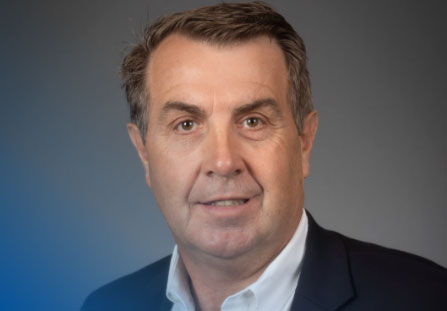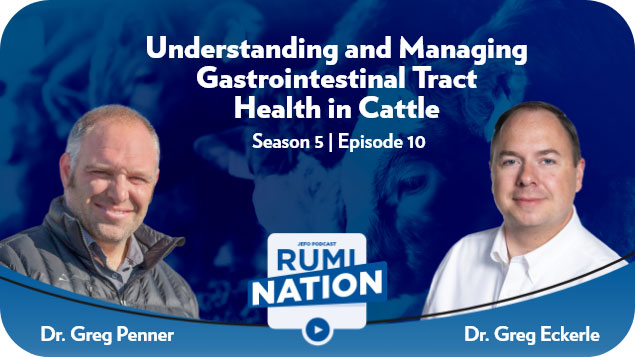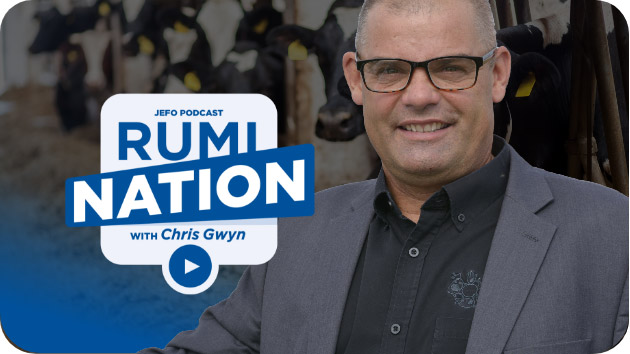RumiNation | S05 : E11
Metabolism in Cattle for Muscle and Overall Development
Brought to you by Jefo Nutrition
Share now!
Did you enjoy this episode?
Share now!
Our guest - Dr. Bradley Johnson
Dr. Bradley J. Johnson is currently the Gordon W. Davis Regent’s Chair in Meat Science and Muscle Biology and a Professor in the College of Agricultural Sciences and Natural Resources’ Department of Animal and Food Sciences at Texas Tech University since 2008.
Prior to coming to Tech, he was a muscle growth and development Assistant and Associate Professor with the Department of Animal Sciences and Industry at Kansas State University.

Timestamps & Summary
Dr. Greg Eckerley (01:59)
Looking at muscle development, what roles do we see coenzymes play in upregulating energy to help with growth?
Dr. Bradley Johnson
[…] [the] energy needs for both postnatal muscle growth as well as the functionality of skeletal muscle that being contraction, we need a lot of ATP. And of course, we know that the coenzymes are going to assist with this. All the way from the shortest burst of energy that we’re going to get to produce ATP and muscle is the ATP-PC system, which is the phosphocreatine system, which within seconds can produce ATP. […]
From thiamine to niacin to riboflavin, pyridoxine, biotin, cyanocobalamin, pyridoxine, and pantothenic acid, all these are coenzymes. Very important for energy metabolism for every cell. But it becomes very critical for postnatal muscle growth because protein synthesis is so demanding that we have ATP.
Dr. Greg Eckerley (06:37)
Can we hypothesize and think that genetic development and advancement have placed a higher demand for certain nutrients that were historically not apt to look at?
Dr. Bradley Johnson
[…] Our thought early on was: if we have aggressively implanted cattle then they must have higher nutrient needs. Certain nutrients like crude protein or specific amino acids or even calories, do they need more energy. And in reality, those growth-enhancing tools did not change the needs for some of these. They made them more efficient. And so today, our cattle genetically and the way we feed them, nutritional management, we have some of the best feed conversions we’ve ever had in our beef cattle industry worldwide because of our advancements in genetics, feeding strategies, and total nutrient requirements. […]
Dr. Greg Eckerley (16:24)
Can we utilize certain vitamins like biotin […] in certain feeding period roles to maximize this potential, to alter program metabolism for these animals as they go through the feeding period?
Dr. Bradley Johnson
I tell you what, biotin is so intriguing to me. I think there’s a lot of anecdotal work out there and I think it started in Australia, but a lot of people on the Wagyu cattle, the heavy marbled side, felt they could increase marbling by feeding elevated biotin to ruminants. […]
If we feed a high grain diet to finishing cattle, the one B vitamin that’s probably going to be compromised the most in the rumen is biotin. […]
Dr. Greg Eckerley (25:55)
So, in conclusion, would you mind sharing three of your main take-home messages that we talked about today with the audience?
Dr. Bradley Johnson
First off, I think we often forget the energetic cost, not really cost, but protein synthesis is not a spontaneous event. And we think of muscle as the main protein reservoir in the carcass, obviously. And that comes at a cost. It takes a lot of ATPs […]
The other big take-home that I think the one molecule that I’m the most excited about of having direct effects both on muscle growth and marbling is biotin and knowing that biotin affects enzymes similarly to a beta-agonist, I think there are opportunities to enhance muscle growth. […]
The final take home is our US. Food and Drug Administration, I think, is going to continue to offer regulatory oversight […] on some of these medicated feed additives, over-the-counter antibiotics, normal growth promoting techniques like implants and beta-agonists that we’ve become used to using. And, obviously, the more natural alternatives that we can seek and find and utilize in our industry, I think the better off we’re going to be in the long run.







